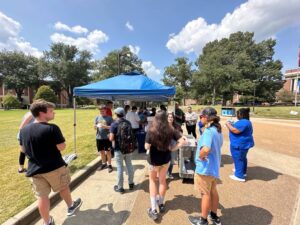Few books have impacted my approach to campus ministry more than Robert Coleman’s The Master Plan of Evangelism. Don’t let the title fool you. It’s not just another book on evangelism. Instead, Coleman examines Jesus’s relationship with his twelve disciples to see how he equipped them for ministry. These twelve ordinary men led the greatest spiritual multiplication movement that the world has ever seen. In three short years, they went from a rag-tag group of nobodies to bold evangelists and mission strategists who would change the world. Jesus gave countless hours training them until they were fully capable to train others. They were disciples who made disciples. The next generation of disciples followed the same plan and passed on faith to even more disciples…generation after generation. And now millions of people call on Jesus’s name because of the genius of the Master’s plan of evangelism.
Sadly, many churches and ministries don’t follow the Master’s plan. Instead, we depend on programs and events that make converts and consumer Christians. But Jesus made disciples… who made disciples… who made ever more disciples. Coleman says that we need to continually evaluate our ministry and ask these hard questions: “Is it worth doing?” “Does it get the job done?” “Do we see an ever-expanding company of dedicated men/women reaching the world with the Gospel as a result of our ministry?” No other plan can make a dent in the lostness of the world. So let’s follow the Master’s plan!
Coleman identifies eight guiding principles from Jesus’s ministry: selection, association, consecration, impartation, demonstration, delegation, and supervision. These make a perfect blueprint for powerful college ministry!
1) Selection
My first ministry was at a large community college. There were a lot of broken, needy, or apathetic students who could easily take up all of my time. However, I gave my best energy to six eager, committed students. They started ministering to the other students, and our ministry reached way more people than I could have by myself. It’s crucial for the college ministry leader to give their best time to discipling people who can disciple even more people.
We must choose carefully who we spend the most time with. Coleman says, “Men were his method of winning the world. Men who would bear witness to his life and carry on his work.” Deeply developing a few strong leaders is WAY more important than gathering a crowd. But they must be the right leaders! In my current ministry, we look for F.A.T. people: faithful, available, and teachable. If a student is loyal to the ministry, makes themselves available for training, and is hungry to learn, then investing in them is GOLD. By focusing on a few, we’re not neglecting other students. Instead, we’re admitting that if we train up disciples, THEY can minister to far more people than we ever could alone.
2) Association
For parents, quality time is a myth. When my kids were little, they needed WAY more than a couple of hours of quality time each week. They just needed LOTS of time with their dad. In the same way, Jesus didn’t train the disciples through weekly classroom seminars. He spent TIME with them, lots of life-on-life time. They traveled with him, ate with him, laughed with him, and ministered with him every single day. They didn’t just absorb Jesus’s ideas; they absorbed his life. Coleman says, “The disciples were his spiritual children and the only way that a father can properly raise a family is to be with it.” Jesus’s disciples were in close association with him. And eventually, their disciples were in close association with them. In 1 Thessalonians 2:8, Paul says to his disciples, “We loved you so much that we were delighted to share with you not only the Gospel of God but our lives as well because you had become so dear to us.”
In college ministry, the only way to make disciples is by spending time with people. Sharing your life with them. Association is especially important for new believers. They need immediate and frequent follow-up. New believers need more than just a weekly Bible study. They need a trusted Christian friend to SHOW them how to follow Jesus. And that takes precious time.
3) Consecration
During my junior year of college, I didn’t believe that I could be a Christian leader. Then my campus minister pulled me aside, looked me in the eye, and said, “I believe you could impact other people for Christ. I want you to lead a Bible study. I believe in you, and I’ll help you.” No one had ever told me that before. He believed in me and called me to serve beside him. He consecrated me into ministry. This is what Jesus did with the twelve. “Come follow me,” he said, “And I’ll make you fishers of men” (Matthew 4:19). Jesus set a high standard, but then told people he believed they could do it. Robert Coleman says, “Jesus expected the men he was with to obey him. They were not required to be smart, but they had to loyal. But over time obedient followers invariably take on the character of their leader.”
When we call students to a high standard, they often rise to the occasion. It’s beautiful to see! If we’re content with half-hearted commitment, then that’s all we’ll get. Don’t be afraid to call out the best in your students. Give them hard things to do, and tell them that, by God’s grace, they can do it!
4) Impartation
When I was young and dumb in ministry, I cared too much about building MY ministry. I wanted to GET recognition. I wanted to GET respect. However, Jesus came to GIVE his life to others. Jesus gave everything he had to his disciples. He lived completely dependent on the Holy Spirit. Ultimately, Jesus gave up his life on the cross. His evangelistic strategy depended on his disciples following the way of their Master. They couldn’t strive to build their own kingdom; they must build his. They couldn’t minister with their own strength; they needed complete dependency on the Holy Spirit. They needed a passion for God’s kingdom and a broken heart for the lost. Coleman says, “Jesus lost no opportunity to impress on his followers the deep compulsion of his own soul aflame with the love of God for a lost world”
We don’t do college students any favors when we encourage them to pursue the American Dream with a little bit of Jesus on the side. We must both model and plead for their complete surrender to God’s will and their lives dedicated to reaching the lost.
5) Demonstration
Jesus taught the masses but he SHOWED his disciples how to live. Jesus didn’t lecture the disciples on how to do ministry. Jesus gave first-hand demonstrations on how to live, how to pray, how to use the Scripture, how to love others, how to evangelize. Coleman says, “Jesus did not ask anyone to do or be anything which first he had not demonstrated in his own life.”
My ministry at UT Arlington has a reputation for training students in evangelism. Most of our student leaders are confident to share their faith and do it often. However, this culture didn’t develop overnight. It started years ago with one student named Nate who took two or three guys with him on campus to share the gospel. He passed it on to people who passed it on to others. Now there are students who’ve never met Nate that are teaching other students how to share the Gospel. That’s the Master’s plan!
Sometimes with college students, we want our whole group to learn to pray so we do a sermon on prayer. We want them to evangelize so we have a one-time training in evangelism. But these essential disciplines of the Christian faith are caught more than taught. We teach students to pray by praying with them. We teach them to evangelize by taking them with us as we evangelize. Obviously, college ministries should teach about Christian life during large group meetings. But the only way to make disciples and change the culture of a group is by modeling the Christian life to a few who can pass it on to others.
6) Delegation
When I was a kid, I watched my dad mow the grass. Then, he let me push the mower with some very close supervision. Eventually, you guessed it, it was my turn. He turned the job over to me and he watched. Jesus did the very same thing with his disciples. He showed them how to preach and minister. They learned firsthand at the feet of the Master. Then eventually, it was their turn. He sent out the twelve to preach and report back. Then, he did the same with 72. Finally, after his ascension the mission was theirs: fully delegated to his disciples. It was Jesus’s intention from the beginning to train them to be fishers of men.
Too often in college ministry, we treat students as “kids”. We don’t trust them with responsibility. When really they are young adults, probably the same age as Jesus’s disciples. We make disciples by first imparting and demonstrating and then by delegating. We give students assignments. After showing them how to pray, we send them to pray. After teaching them to read the Bible we challenge them to read it daily. After showing them how to evangelize, we ask them who they want to share the gospel with this week. Don’t be afraid to delegate!
7) Supervision
After Jesus delegated ministry to the disciples, he gathered them again to followed up and give more instruction. They reported their successes and failures. Jesus kept a check on them and continuously reviewed and gave them applications to their lives. Success was great but failures were even better because failure created a learning opportunity. This cycle of teaching, sending, and debriefing with his disciples was Jesus’s method for supervision. And this is exactly what college students need! Imagine a young man or woman who loves Jesus and is hungry to grow. Then someone a little older invites them to along to participate in their ministry. The young disciple gets more and more responsibility delegated to them with feedback and instruction all along the way. Before long at all, they’re passing it on and discipling someone else. It’s beautiful!
8) Reproduction
Jesus’s master plan was to produce disciples who would reproduce. It depends on Christians being faithful and fruitful. Reproduction is the heart of the Great Commission and the only hope for the world to be reached with the gospel.
Did you know that the largest stadium in the world is in Korea and holds 114,000 people? Imagine filling that stadium with lost people, preaching the gospel, and every single person gets saved! And then the next day, another full stadium meets the Savior. Then again every single day. Sounds like a good plan to me! The problem is, every single day 170,000 people die without Christ. My great “stadium” plan can’t overcome the world’s lostness. But imagine if we followed the Master’s plan. Imagine if every Christian in the world spent three years like Jesus did winning just one person to Christ and discipling them to maturity. And then the cycle repeated two more times. The whole world would be reached in less than a decade. That’s why I’m giving my life to the Master’s plan of evangelism!
This is a resource that was put together as part of the training process for Campus Multiplication Network. The vision of CMN is to equip leaders who desire to plant new ministries on college campuses until there is no campus left without a multiplying gospel movement. We provide training and coaching for collegiate ministry leaders who are looking to accelerate evangelistic growth and start new multiplying campus ministries. For more information, you can email campusmultiplicationnetw






